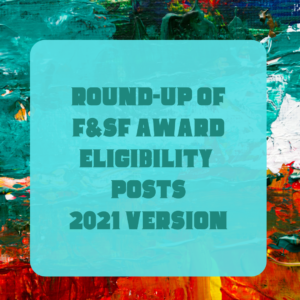
 Hello! While most years I compile a page of award eligibility posts, this year I’m going to be on the road in November, and adding that responsiblity to everything else I’m doing that month seems a little crazypants. So if you’ve got an award eligibility post, I invite (and encourage) you to drop a link to it in the comments here!
Hello! While most years I compile a page of award eligibility posts, this year I’m going to be on the road in November, and adding that responsiblity to everything else I’m doing that month seems a little crazypants. So if you’ve got an award eligibility post, I invite (and encourage) you to drop a link to it in the comments here!
I had no novels published in 2022 myself, but I’d certainly love it if you’d check out my short story, “The Woman Who Wanted to be Trees,” which appeared in Slate Magazine, and consider recommending it for Hugo or Nebula Award reading.
...
 It’s that time again! Once again I have created this post for consolidating fantasy and science fiction award eligibility round-ups. If you are an F&SF writer, editor, podcast, or publisher working in comics, fiction or games, I hope you’ll let people know what you have that they should be reading.
It’s that time again! Once again I have created this post for consolidating fantasy and science fiction award eligibility round-ups. If you are an F&SF writer, editor, podcast, or publisher working in comics, fiction or games, I hope you’ll let people know what you have that they should be reading.
Past things I have written about why writers should do this include On Awards: To Be Pushy Or Not To Be Pushy (2014), The Spontaneous Knotting of an Agitated Awards Process (2015), and To Eligibility Post or Not to Eligibility Post? (2016).
Want a sample post? Here’s mine for this year.
Here are the previous such round-up posts from 2017, 2018, 2019, and 2020.
...
Want access to a lively community of writers and readers, free writing classes, co-working sessions, special speakers, weekly writing games, random pictures and MORE for as little as $2? Check out Cat’s Patreon campaign.

"(On the writing F&SF workshop) Wanted to crow and say thanks: the first story I wrote after taking your class was my very first sale. Coincidence? nah….thanks so much."

(science fiction, flash story) Discretion was the company’s watchword, or so Tiffany had been assured by Maria, who lived two floors down and had done it three months ago. No one needed to know. The technician was a thin blond youth, the left half of their face a conservative faux-tribal tattoo medley, almost retro, dressed in a bland-patterned coverall. They carried a slim silver box, briefcase shaped and sized, the handle set on one of the smaller sides.


This site is protected by reCAPTCHA and the Google Privacy Policy and Terms of Service apply. This site is a participant in the Amazon Services LLC Associates Program, an affiliate advertising program designed to provide a means for sites to earn advertising fees by advertising and linking to Amazon.com.